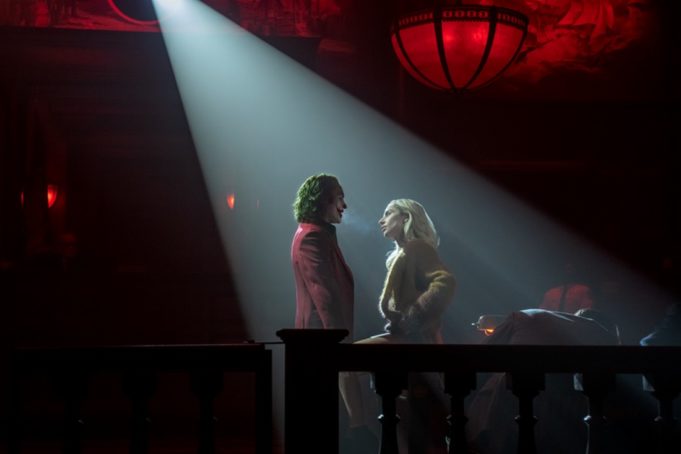I didn’t weigh in on 2019’s Joker when it came out because I didn’t see it until the end of that year for awards consideration. When I did, I read the review that ran in our pages and agreed with pretty much everything we wrote about Todd Phillips’ supervillain movie. This week, the sequel Joker: Folie à Deux replaces the original’s action sequences with musical numbers and demonstrates some isolated glints of awareness as to why people hate the original so much. They’re only glints, though. A more intellectually disciplined filmmaker than Phillips would have made this more of a corrective to the first movie, but then, if he’d been more disciplined, the original film wouldn’t have needed correcting in the first place. The sequel does earn itself a half-measure of redemption for the original. But only a half-measure.
The sequel mostly takes place at Arkham State Hospital, where Arthur Fleck (Joaquin Phoenix) awaits trial for the murders he committed in the first movie. Since he has been a model prisoner, the guards let him take a music class with the inmates in the minimum-security wing, among whom is psychotic patient Lee Quinzel (Lady Gaga). She has been in love with Arthur ever since she watched him kill Murray Franklin on live TV, and she declares her love first by singing “Get Happy” to him and then by setting Arkham’s music room on fire. Once Lee somehow secures her release from the asylum, she starts interfering with his attorney (Catherine Keener), who’s attempting to mount an insanity defense for him.
The songs here are Broadway and jazz standards, and they do help somewhat to make this sequel less depressing than the original. However, Phillips doesn’t do enough to distinguish between the numbers that are taking place in the characters’ minds (Arthur bursting into “For Once in My Life” while his fellow inmates taunt him about the possibility of execution) and the ones in their reality (Lee visiting Arthur in prison and singing “(They Long to Be) Close to You” through the bars). The vocal performances by Phoenix and Gaga are good but only rarely carry the emotions of the story, as when Arthur tries to woo Lee back by singing “If You Go Away” into her answering machine. That number shows the difference between a great singing actor and a great singer, as Lady Gaga is secure in the songs, but her attempt to make Lee a figure of pathos keeps her from showing the blazing presence from her previous two films.
Nor does Phillips do much to illustrate how these numbers are springing from the two main characters’ disintegrating minds. It’s possible to make a successful musical out of an unremittingly bleak story — think Pennies from Heaven or Dancer in the Dark, with their numbers lighting up the general gloom — but it helps when the numbers soar cinematically. Phillips stages them competently but never reaches those heights, and his best use of musical tropes is near the end at the staircase where Joker first danced onto the scene, as Arthur runs up toward Lee and the streetlamps flick on as he runs by. Our knowledge that their bad romance is already through undercuts the magic of the visual.
The movie could have used some of the cynical glee of Chicago, but it tries to grow a conscience instead. This would be admirable, but Phillips doesn’t have the ability to see it through. The closest it comes is when Gary Puddles (Leigh Gill) reappears and breaks down on the witness stand while describing how his life was wrecked by seeing his best friend turn into a killer before his eyes. It’s grimly satisfying, too, when Arthur realizes what a monster he’s created only when it’s too late for him. To get there, though, you have to sit through more misery piled on top of misery, as the Arkham guards take revenge for Arthur calling them stupid at trial by (it’s implied) raping him and then (it’s not implied) straight-up murdering a young inmate (Jacob Lofland) who idolizes the Joker. A good movie could have been made out of the elements in Joker: Folie à Deux, including the musical numbers. Unfortunately, Todd Phillips was never the guy to direct it.
Joker: Folie à Deux
Starring Joaquin Phoenix and Lady Gaga. Directed by Todd Phillips. Written by Scott Silver and Todd Phillips. Rated R.












